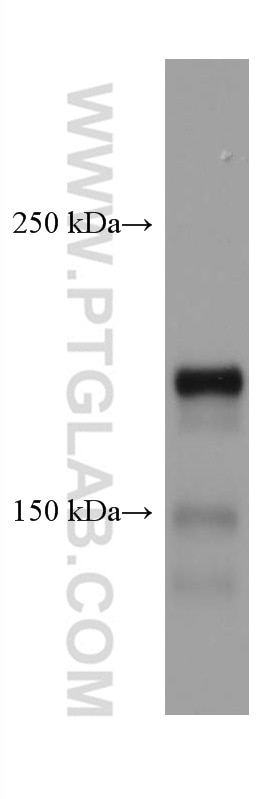DCC-Specific Monoclonal antibody
DCC-Specific Monoclonal Antibody for WB, ELISA
Host / Isotype
Mouse / IgG2a
Reactivity
Human, Mouse and More (1)
Applications
WB, IF, ELISA
Conjugate
Unconjugated
CloneNo.
2G4G4
Cat no : 67203-1-Ig
Synonyms
Validation Data Gallery
Tested Applications
| Positive WB detected in | mouse brain tissue |
Recommended dilution
| Application | Dilution |
|---|---|
| Western Blot (WB) | WB : 1:1000-1:4000 |
| It is recommended that this reagent should be titrated in each testing system to obtain optimal results. | |
| Sample-dependent, Check data in validation data gallery. | |
Published Applications
| WB | See 2 publications below |
| IF | See 2 publications below |
Product Information
67203-1-Ig targets DCC-Specific in WB, IF, ELISA applications and shows reactivity with Human, Mouse samples.
| Tested Reactivity | Human, Mouse |
| Cited Reactivity | mouse |
| Host / Isotype | Mouse / IgG2a |
| Class | Monoclonal |
| Type | Antibody |
| Immunogen | DCC-Specific fusion protein Ag20569 相同性解析による交差性が予測される生物種 |
| Full Name | deleted in colorectal carcinoma |
| Calculated molecular weight | 1447 aa, 158 kDa |
| Observed molecular weight | 180 kDa |
| GenBank accession number | NM_005215 |
| Gene symbol | DCC |
| Gene ID (NCBI) | 1630 |
| RRID | AB_2882496 |
| Conjugate | Unconjugated |
| Form | Liquid |
| Purification Method | Protein A purification |
| Storage Buffer | PBS with 0.02% sodium azide and 50% glycerol pH 7.3. |
| Storage Conditions | Store at -20°C. Aliquoting is unnecessary for -20oC storage. |
Background Information
DCC, also named as IGDCC1, belongs to the immunoglobulin superfamily and DCC family. DCC is a receptor for netrin required for axon guidance. DCC plays a key role in the developing nervous system. Its association with UNC5 proteins may trigger signaling for axon repulsion. It also acts as a dependence receptor required for apoptosis induction when not associated with netrin ligand. DCC gene is a tumor suppressor gene. This antibody recognizes endogenous DCC with an apparent molecular weight of 180 kDa. As the predicted molecular mass of DCC is 158 kDa, the slower mobility is likely attributable to post-translational modification, perhaps by glycosylation at potential N-linked glycosylation sites (PMID: 7926722; 8044801).
Protocols
| Product Specific Protocols | |
|---|---|
| WB protocol for DCC-Specific antibody 67203-1-Ig | Download protocol |
| Standard Protocols | |
|---|---|
| Click here to view our Standard Protocols |
Publications
| Species | Application | Title |
|---|---|---|
J Ethnopharmacol Novel mechanisms of Anshen Dingzhi prescription against PTSD: Inhibiting DCC to modulate synaptic function and inflammatory responses | ||
Neurobiol Stress DCC, a potential target for controlling fear memory extinction and hippocampal LTP in male mice receiving single prolonged stress |


